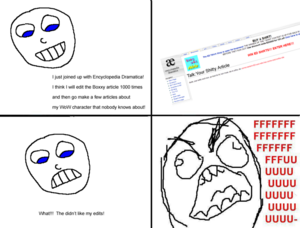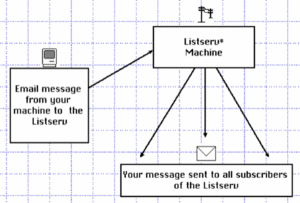- Portals
- The Current Year
- ED in the News
- Admins
- Help ED Rebuild
- Archive
- ED Bookmarklet
- Donate Bitcoin
Contact an admin on Discord or EDF if you want an account. Also fuck bots.
User Stress Syndrome
There is a surprisingly large quantity of hurt feelings amongst those who have made a transitory home of Encyclopedia Dramatica. Often times, the wiki’s callous nature and seemingly unfeeling attitudes will bring about these feelings in newer users because of its swift and dedicated manner. To the average new person (and even to some of the older users), using or editing this wiki for the first time, sysops and veteran editors will seem insensitive, unfeeling, and cruel to the point of being almost fanatical about their indifference. This article is to inform such users that yes, these coldhearted feelings you experience occasionally while playing with the wiki are in fact true feelings. Encyclopedia Dramatica gives more care to a diseased set of sweaty pachyderm balls, minced fine and allowed to sauté with onions, garlic, celery and carrots, then served on a steaming bed of kluski noodles made from the rotting intestinal worms found within the bowels of a retarded and homosexual yak than it does to your feelings. The quicker you realize this, the better off you are.

The Common and Incorrect Approach

The common approach used when a person wishes to advance some new idea or to tackle the writing of a new article is as follows:
- They register with the wiki.
- They do not read anything concerning what a new user should know.
- They begin making a new article.
- They place the article in the main encyclopedia.
- They go and tell all their friends about the “cool ED page” they have just made.
While this may seem innocuous at first, it is probably one of the most offensive ways to join an already established community. It can be compared to entering a room full of nuns, busy with prayer, and announcing that you wish to anally assault the lot of them using cast iron garden implements. As you can expect, doing this to nuns will probably (at the least) earn you a reprimand of some sort. You can also expect some sort of reprimand on Encyclopedia Dramatica as well, usually in the following form:
- The article you have placed will be moved to your user space.
- You will be told that the article you have made is not funny, does not have proper context, or that it is in some way not up to the standards that *Encyclopedia Dramatica enjoys.
- You will then be given pointers on how to improve your article or, if worse comes to worst, you will be told that your idea is not a good one and no further attempts should be made on your part to do anything with the article in question.
While the preceding list of steps is the usual way in which veterans and sysops deal with new users and articles that they create, it is also a rather polite way of describing the process. As with mistakes you might make in your non-internet life, you can probably expect some good-natured ribbing from your friends, especially if the mistake you made is a particularly bone-headed one. While on Encyclopedia Dramatica, the same thing will occur. Because you do not know the rules yet, and perhaps have made an article or edit that is not considered acceptable, you will be the recipient of some of our good-natured ribbing. Usually this ribbing can be nasty and may (on the surface) appear to be quite mean-spirited, but rest assured that it is in your best interest to play along and to not think too hard upon an off-color comment left on your user page by some fellow wiki user. What is in your best interest is to listen to what people are telling you.
The Correct Approach


Since we have covered the common ways that new users might make mistakes upon this wiki, it is only fair to now include the correct way to enter into this community with the least amount of tribulation on your part and a minimal amount of suffering on the part of the already established community members. Here are some helpful tips:
- Make edits. Prove that you are an earnest and useful contributor. This means correcting facts, spelling, grammar, and punctuation. It also means knowing when to edit something, but also (more importantly) when not to edit something. By doing these things over a short period of time, you will begin to become familiarized with how things work.
- Lurk moar. Never has a meme uttered been more true. Take some time and learn the ropes here; if you do not, you are more than likely going to be strangled by them.
- Encyclopedia Dramatica is not /b/. This little saying, while so simple, is probably the hardest thing for new users to understand. Many of our best editors, writers and sysops may be frequent visitors to the various /b/ boards found around the internet, but once they leave those places and come to Encyclopedia Dramatica to edit and write, they leave that balderdash behind and assume a more developed tone.
- Do not argue with sysops. Arguing with a sysop on Encyclopedia Dramatica is akin to arguing with someone much larger and much stronger than you in their own home. If you are lucky, you will only be asked to leave and perhaps you may be invited back. If you are unlucky, or if the argument is particularly upsetting, you will be permanently removed and will not be invited back.
- In-jokes, while hilarious to those who are “in the know,” are almost always meaningless to those who are not familiar with the subject matter. Minimize or halt the use of in-jokes.
By using these tips and some plain common sense, you shall become a well respected member of the Encyclopedia Dramatica Community and will probably wish to write your own articles soon enough. You may even be asked by a senior member to perform some chore. It is not only considered very helpful to assist those already well established within the wiki, but it can be considered an honor, in most circumstances. Once you have begun your task, the following correct approach is one that has proven to be the best for all Encyclopedia Dramatica users concerned:
- Become very familiar with your target. This means study the facts, draw conclusions, and gain a good working knowledge of the person, site, or situation you wish to describe.
- Become familiar with wiki markup language.
- Begin writing your article. Do this only within the sandbox provided or within your user space. Be sure to point out facts often and make sure you have links to those facts. Quotations and screenshots are also great ways to further your article’s case. It never hurts to be funny as well, but remember that humor comes in many flavors.
- Once you have finished your article, contact others within the community and ask their opinion of it. Does this article deserve a place within the wiki? If it does, proceed to move it over into the main wiki space. It is probably a good thing to contact a sysop at this point and explain what it is you are doing. Sysops can prevent your article from being ruthlessly attacked or (worst case scenario) being deleted. The sysops are there to help, so don’t be shy, but also remember that there are many thousands of users on Encyclopedia Dramatica and new articles are but one of their many duties.
Now that your article is in the main space, keep an eye on it. This means: reading the comments under the discussion tab at the top of the page, trying to update it when possible, and putting any finishing touches on the article that it may need. While you are doing this, you may find that other users have made comments about it. Try to have thick skin when reading these comments, as sometimes they can be quite nasty. Never fear, the fact that your article has comments at all means you did something right.
The Agony of Being Banned



Many users act as if they are being unceremoniously nailed to a cross when they are banned. The fact of the matter is that being banned, while shocking at first, is not as bad as it seems. Consider the fact that most blockings handed out by sysops are for a relatively short time span and that the permanent ban is only used as a last resort, then take a deep breath. Yes, you were banned. Yes, they called you names. Yes, it probably stung a bit. But 99.9% of the time a ban is the only way a sysop can get your attention. They use this tool to stop you from doing something wrong or to cool off a situation before it becomes so hot that you cannot back out without losing any and all privileges permanently.
While most bans are of a temporary nature, some are permanent. There are several reasons for being permanently banned:
- A user is a sock puppet and is causing problems within the community.
- A user has “sassed” a sysop – more on this later.
- The banned user has uploaded questionable content to Encyclopedia Dramatica. While racy content is not a problem, if the content is illegal, it should never have been uploaded in the first place.
- The banned user is a repeat offender. If you have been banned for a particular thing, do not, under any circumstances, go and do it again.
- The banned user has caused problems on Encyclopedia Dramatica’s IRC server. While this is rare, it has occurred.
While this list is by no means complete, it is a list of the general things that will cause a person to receive a permanent banning and should be considered a good set of guidelines to follow. As stated previously, most blocks will not fall under the above category of “permanent banning.” Almost all bans fall under a time limit. What this means is that a sysop has seen what you are doing and has decided to stop you. In most cases the block will last no more than a week. What should you do while you are waiting?
- Find out exactly what it is you have done wrong and improve that situation.
- Work on making better edits. Watch what other, unbanned users are doing and attempt to emulate them. This is by no means a rule telling you to “do exactly what other people are doing.” It is more of another guideline to follow.
- Do not complain. Users who complain about bans and complain about reverted edits are almost always scorned by the community as a whole.
- Toughen up. You are going to catch flak here, there is no way around it. The quicker you can become immune to negativity and harsh language, the better.
A Brief Note on Sysops

This is Encyclopedia Dramatica's list of SysOps. It is a good idea to familiarize yourself with the names on that list.
As stated above, sysops are here to help you. They are not, however, enchanted genies that can be summoned from magical lamps whenever you rub them. Sysops have a multitude of duties that include many things besides doing your bidding whenever you demand it. Your questions, requests, and edits will be gotten to in due time. If a few days go by and your queries have not been attended to, please ask another sysop or bring up the question on the Encyclopedia Dramatica mailing list. You will find answers there.
If you are impatient or impudent with a sysop, you are probably going to be given some time off (see above). Do not persist with your attitude or escalate it to “tantrum levels” as this will only further damage your chances of being a member of the Encyclopedia Dramatica community. Further, if you persist, your actions will be made public on the wiki and you will be given the negative notoriety of becoming an example of “how not to do things.” Not only have you caused yourself to lose your wiki privileges, but you are also now part of the lore of the site itself.
See Also
- Encyclopedia Dramatica:Basic Rules - This page should be your first stop before you do anything on this site.
- Encyclopedia Dramatica:About - A general idea of what is going on.
- Help:Contents - Everything you really need to know.
- Encyclopedia Dramatica:Templates/All - Some things to work with.
- Sandbox - A thing to work in.
- Categories - Narrow down your subject.
- Encyclopedia Dramatica:Collapsing Objects - Help streamline your page.
- Encyclopedia Dramatica:Morphing Objects - Further streamlining.
- HTML - A good working knowledge of HTML is a great help.
- Encyclopedia Dramatica:Formatting - the funky shit.
- Girl on the Internet Syndrome - another disease discovered by Encyclopedia Dramatica
| User Stress Syndrome is part of a series on Language & Communication | |
|---|---|
Languages and Dialects • Grammar, Punctuation, Spelling, Style, and Usage • Rhetorical Strategies • Poetry •
The Politics of Language and Communication • Media • Visual Rhetoric
Click topics to expand |

|
